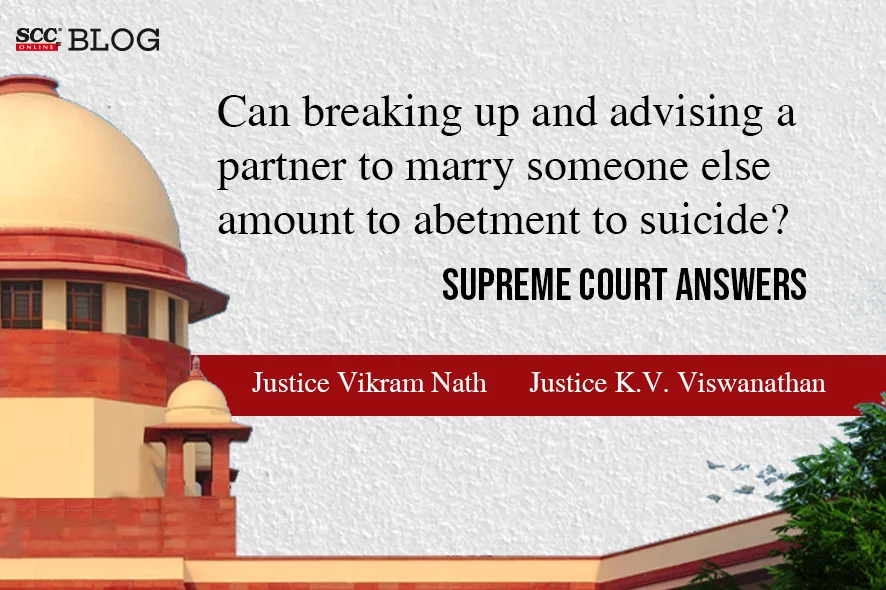Supreme Court: In an appeal filed against the judgment passed by the Madras High Court, wherein the Court has refused to quash the criminal proceedings initiated against the accused under Sections 417, 306 of the Penal Code, 1860 (‘IPC’) read with Section 4 of the Tamil Nadu Prohibition of Harassment of Woman Act, 2002 (‘TNPHW Act’), the division bench of Vikram Nath and K.V. Viswanathan, JJ. while setting aside the impugned judgment quashed the criminal proceedings against the accused. Further, it said that the accused, by breaking up the relationship with the deceased and by advising her to marry in accordance with the advice of her parents had not intended to abet her suicide. Hence, it held that the offence under Section 306 is not made out.
Issue: Whether, taking the prosecution case as it is, any case for proceeding with the trial under Sections 306, 417 of IPC read with Section 4 of TNPHW Act is made out?
The accused and the deceased were on intimate terms, and they fell in love in 2014. When the accused got the job with the CRPF, he left the town and even thereafter they were in touch with each other. It is only when the marriage alliance was being mentioned at the accused’s house and when his family started looking for a bride, the deceased appears to have become upset. When the deceased was asked about this fact from the accused, he replied that his mother and younger brother said they would die, and he acceded to their view. The accused advised her to also act according to her parents’ words. Thereafter, the deceased came under mental stress, and she ate rat poison kept in the bathroom of the house.
The Court opined that none of the ingredients to the offences set out in the charge-sheet are attracted.
After perusing Section 306 of the Penal Code, the Court noted that it states that whoever abets the commission of suicide of another person, he/she shall be punished with imprisonment of either description for a term not exceeding ten years and shall also be liable to fine.
After relying upon previous judgments, discussing the elements of Section 306 IPC, the Court said that where the words uttered are casual in nature and which are often employed in the heat of the moment between quarrelling people, and nothing serious is expected to follow from the same, the same would not amount to abetment of suicide.1
Further, it stated that to constitute ‘instigation’, it must be shown that the accused had, by his acts or omission or by a continued course of conduct, created such circumstances that the deceased was left with no other option except to commit suicide2
After taking note of Chitresh Kumar Chopra v. State (NCT of Delhi), (2009) 16 SCC 605, the Court said that different individuals in the same situation react and behave differently because of the personal meaning they add to each event, thus accounting for individual vulnerability to suicide.
The Court said that it could not be said that the actions of the accused instigated the deceased to take her life or that he conspired with others to ensure that the person committed suicide, or any act of the accused or omission instigated the deceased resulting in the suicide.
The Court remarked that broken relationships and heart breaks are part of everyday life. It could not be said that the accused, by breaking up the relationship with the deceased and by advising her to marry in accordance with the advice of her parents, as he himself was doing, had intended to abet her suicide. Hence, it held that the offence under Section 306 is not made out.
It also held that, as the physical relationship over a considerable period was out of mutual love between the accused and the deceased, and not based on the promise of marriage, the offence under Section 417 of IPC is therefore not made out. Further, it held that the offence under Section 4 of TNPHW Act is also not made out as none of the ingredients are attracted to the case at hand.
[Prabhu v State, 2024 SCC OnLine SC 137, Order dated 30-01-2024]
Advocates who appeared in this case :
For Petitioner(s): Senior Advocate S. Nagamuthu, Advocate-On-Record M.P. Parthiban, Priyaranjani Nagamuthu, Advocate R. Sudhakaran, Advocate T. Hari Hara Sudhan, Advocate Shalini Mishra, Advocate Bilal Mansoor, Advocate Shreyas Kaushal
For Respondent(s): Senior Advocate V. Krishnamurthy, Advocate-On-Record D. Kumanan, Advocate G. Ananda Selvam, Advocate Mayilsamy K, Advocate N.B.V. Srinivasa Reddy, Advocate Arun Pandian S., Advocate-On-Record Lakshmi Ramamurthy
Buy Penal Code, 1860 HERE
1. Swami Prahaladdas 8 v. State of M.P, 1995 Supp (3) SCC 438
2. Ramesh Kumar v. State of Chhatisgarh, (2001) 9 SCC 618







